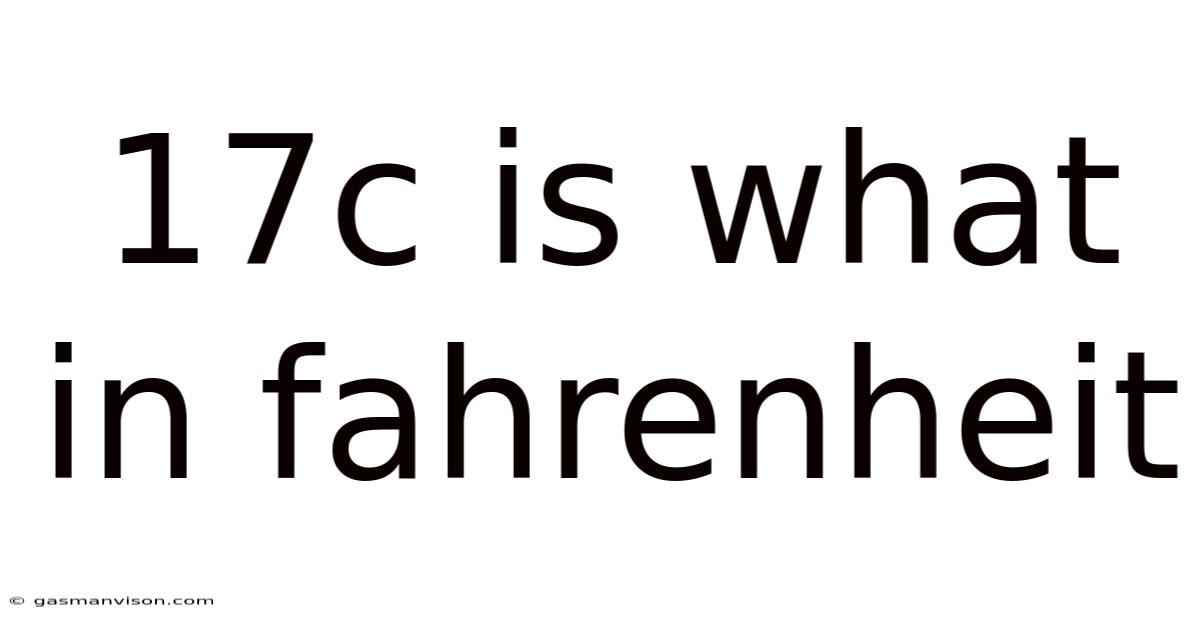17c Is What In Fahrenheit
gasmanvison
Sep 10, 2025 · 4 min read

Table of Contents
17°C is What in Fahrenheit? A Comprehensive Guide to Temperature Conversions
Ever wondered how to quickly convert Celsius to Fahrenheit, or vice versa? Understanding temperature conversions is crucial for various applications, from everyday life to scientific research. This comprehensive guide will not only answer the question "17°C is what in Fahrenheit?" but also delve into the intricacies of temperature scales, providing you with the knowledge and tools to perform these conversions with ease. We’ll explore different methods, address common mistakes, and provide helpful tips for accurate calculations.
Why Understanding Temperature Conversions Matters
Whether you're checking the weather forecast, baking a cake, conducting a science experiment, or simply traveling to a new country, the ability to convert between Celsius and Fahrenheit is a valuable skill. Many countries use Celsius (°C), while others use Fahrenheit (°F). Understanding both scales allows for seamless communication and accurate interpretation of information. This guide will equip you with the knowledge to confidently navigate these different systems.
The Formula: Converting Celsius to Fahrenheit
The fundamental formula for converting Celsius (°C) to Fahrenheit (°F) is:
°F = (°C × 9/5) + 32
Let's apply this to answer our initial question: 17°C is what in Fahrenheit?
°F = (17 × 9/5) + 32 = 30.6 + 32 = 62.6°F
Therefore, 17°C is equal to 62.6°F.
Understanding the Formula: A Breakdown
The formula might seem daunting at first, but it's based on a simple principle: the relationship between the freezing and boiling points of water in both scales. Water freezes at 0°C and 32°F, and boils at 100°C and 212°F. The formula accounts for the different magnitudes and starting points of these scales.
-
Multiplying by 9/5: This step adjusts for the difference in the scale's magnitude. A degree Fahrenheit is smaller than a degree Celsius; hence, the multiplication factor expands the Celsius value to reflect the Fahrenheit scale.
-
Adding 32: This accounts for the difference in the zero points. The Fahrenheit scale starts at 32°F (freezing point of water), whereas the Celsius scale starts at 0°C.
Alternative Methods: Online Converters and Calculators
While understanding the formula is essential, numerous online converters and calculators are available for quick conversions. These tools are readily accessible and eliminate the need for manual calculations. Simply input the Celsius value, and the calculator will instantly provide the equivalent Fahrenheit temperature. This is particularly useful for quick checks or when dealing with multiple conversions.
Common Mistakes to Avoid
When performing temperature conversions manually, certain common mistakes can lead to inaccurate results. Here are some crucial points to remember:
-
Order of Operations: Always follow the order of operations (PEMDAS/BODMAS). Multiplication should be performed before addition.
-
Fractions: Ensure accurate calculation of the fraction 9/5. Using a calculator can minimize errors.
-
Units: Always include the correct units (°C and °F) to avoid confusion and ensure clarity in your calculations.
Practical Applications of Temperature Conversions
The ability to convert between Celsius and Fahrenheit has a wide range of applications across different fields:
-
Cooking and Baking: Recipes often specify temperatures in either Celsius or Fahrenheit. Accurate conversion ensures consistent results.
-
Weather Forecasting: Understanding both scales allows you to interpret weather reports from various sources accurately.
-
Science and Engineering: Many scientific experiments and engineering applications require precise temperature control and accurate conversions between scales.
-
Medicine: Maintaining accurate body temperature readings requires an understanding of both Celsius and Fahrenheit scales.
-
International Travel: Understanding different temperature units helps you prepare for varying climates when traveling internationally.
Beyond the Basics: Kelvin Scale
While Celsius and Fahrenheit are commonly used, the Kelvin (K) scale is the absolute temperature scale. It's used extensively in scientific contexts. The Kelvin scale starts at absolute zero, the theoretical point where all molecular motion ceases (-273.15°C or -459.67°F). Converting between Celsius and Kelvin is relatively straightforward:
K = °C + 273.15
Advanced Temperature Conversion Techniques:
For more complex scenarios involving other temperature scales or needing highly precise conversions, consider using specialized scientific calculators or software designed for such calculations. These tools often incorporate error correction and advanced algorithms for enhanced accuracy.
Troubleshooting Common Conversion Issues:
If you encounter difficulties with manual conversions, double-check your calculations, ensuring the correct order of operations and accurate fraction calculation. Use a calculator to minimize errors, especially when dealing with decimal points. If you’re still facing problems, consult online converters or seek assistance from someone proficient in mathematics.
Improving Your Conversion Skills:
Practice is key to mastering temperature conversions. Start by converting simple values and gradually move to more complex scenarios. Use online quizzes and exercises to reinforce your understanding and identify areas needing improvement. The more you practice, the more confident and accurate you'll become.
Conclusion: Mastering Temperature Conversions
Understanding temperature conversions, particularly between Celsius and Fahrenheit, is a valuable life skill with broad applicability. While the formula might seem initially complex, with practice and attention to detail, performing accurate conversions becomes second nature. Remember the formula, °F = (°C × 9/5) + 32, and utilize the numerous online resources available to assist you. By mastering this skill, you'll be well-equipped to tackle various situations requiring temperature conversions, from everyday tasks to scientific endeavors. Remember to always double-check your work and use appropriate tools for precise calculations, ensuring accuracy in your results.
Latest Posts
Latest Posts
-
What Equals 64 In Multiplication
Sep 10, 2025
-
How To Measure 12 Ounces
Sep 10, 2025
-
Team Response Scenario Theo James
Sep 10, 2025
-
Distance Across Us In Miles
Sep 10, 2025
-
29 Degrees C To Fahrenheit
Sep 10, 2025
Related Post
Thank you for visiting our website which covers about 17c Is What In Fahrenheit . We hope the information provided has been useful to you. Feel free to contact us if you have any questions or need further assistance. See you next time and don't miss to bookmark.